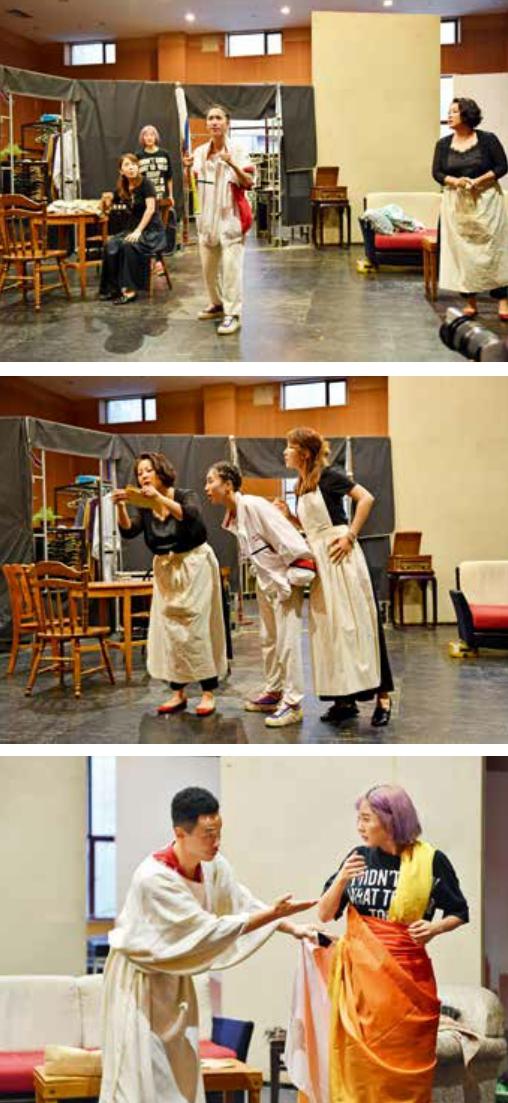A Raisin in the Sun:Chinese-Language Production of an African-American Play
2020-02-04byGongHaiying
by Gong Haiying
A new production of the play A Raisin in the Sun, directed by Chinese director Ying Da, was staged at the Capital Theater in Beijing on September 1, 2020. The first play produced by the Beijing Peoples Art Theater (BPAT) this year, A Raisin in the Sun was highly anticipated after the long epidemic drought.
A Raisin in the Sun is a drama by the African-American playwright Lorraine Hansberry. The title derived from the poem Harlem by Langston Hughes. The play was a great success when it debuted on Broadway in 1959. The main characters are members of a black family that receives US$10,000 from a life insurance policy after the fathers death in Chicago in the 1950s. Instead of providing salvation, the money causes intense disagreement over what to do with it. Director Ying was drawn to the play for its exploration of relationships between people, between people and money, and between reality and ideals. He thinks the story is highly relevant to the current reality even coming from an American play written more than half a century ago.
A Touching Tragicomedy
Ying noted that the Chinese version of this classic American drama was translated in the 1960s by his mother, Wu Shiliang. Over the past six decades, the script navigated a tortuous chain of custody before finally reaching his hands. He still has “mixed feelings” about the debut of the play at BPAT, where his mother also worked as an acclaimed actress.
Yings strong emotions seemed to be shared by the audience. His uniquely comedic directing style invited tears and laughter and kept the spectators completely absorbed for three hours. Ying considers the play a “tragicomedy.”
“I know which parts in the play are meant to be funny,” he said. To maximize the comic effect, Ying keenly dug into details to naturally highlight comedic elements. “This drama is very informative and impressive,” he added. “The ending is perfect, and the engaging plot is still deeply touching today. We laugh and weep with the story. Its hard to generalize the play. If you must assign a word to it, call it a tragicomedy.”
The first play by a black female playwright to receive mainstream attention and acclaim from literature and drama circles in the United States, A Raisin in the Sun explores the confusion the AfricanAmerican community felt while finding their identity in Chicago in the 1950s. The hardships and sufferings the family encounters dont erode their confidence but provide an opportunity to strengthen their self-identity. Chinese media professional Wang Zheng noted that the plays message is to forget about skin color and live with dignity.
Foreign Drama in Beijing Dialect
BPAT has continuously produced foreign dramas from Brazilian playwright Guilherme Figueiredos Aesop in 1959 to Death of a Salesman by American playwright Arthur Miller in 1983 to The Caine Mutiny Court-Martial by American writer Herman Walker, which premiered in 1988. For this production, the thorniest issue for Ying was how to portray an African-American family with an allChinese cast for a Chinese audience.
“Actors and actresses from BPAT can capture the happiness, anger, and sorrow of African-American characters without heavy makeup or affected characterization,” Ying said. He settled on lightly bronzing the actors faces and using wigs. The Beijing dialect also drew the Chinese audience closer to the foreign characters. Ying found consensus with the cast on the goal of the play: to highlight the diversity of humanity and commonality of emotion regardless of cultural differences, nationality or race.
In addition to an insightful Chinese translation of the drama and a thoughtful and creative director, the play featured a cast of outstanding performers. As the family matriarch Lena Younger, Wang Qianhua radiated the warmness and optimism of a mother within the constraints of the unique experience of the character. Jin Han played the son who is young with impulsive and fantastic ideas but little planning. Xu Jingyao played the kind-hearted and down-to-earth daughterin-law. Xu Cenzi played the daughter striving to find an identity as a black woman pursuing a medical career.
Set in Chicago in the 1950s like the original, the authentic American set design and about 20 original Chicago Blues songs provided an ideal atmosphere for the action, which kept the audience drawn in until the curtain fell.